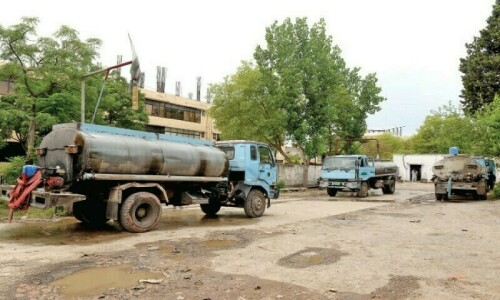ISLAMABAD: The government on Thursday notified the $497 million financial close of another 330MW coal-based power project at Thar.
The financial closing documents for the 330MW mine-mouth lignite coal power project at Thar Block-II were signed by Managing Director of Private Power & Infrastructure Board (PPIB) Shah Jahan Mirza and Thar Energy Ltd (TEL) chief executive Saleemullah Memon. Energy Minister Omar Ayub Khan was also present on the occasion.
Earlier, two projects of 330MW each of Engro Group had achieved the financial close and started power generation.
The TEL will also be developing another 330MW project in due course. Hubco currently holds 60pc of the equity in TEL while the second major investor FFC has 30pc equity stake. The Chinese CMEC TEL Power Investments Ltd (CTPIL) holds the balance 10pc equity in the project.
The Implementation Agreement (IA) of the project was signed on Nov 10, 2017.
The project is being jointly sponsored by Hub Power Company Ltd (Hubco), Fauji Fertiliser Ltd (FFL) and China Machinery and Engineering Corporation (CMEC) under the China-Pakistan Economic Corridor (CPEC) framework. The total cost of the project is $497m.
China Development Bank (CDB) and Habib Bank Ltd (HBL) are the lead lenders. The CDB is the lead arranger of foreign financing from China while HBL is the lead arrangement for local financing.
The project will utilise Thar coal supplied by Sindh Engro Coal Mining Company (SECMC) from its second phase mine and after implementation of this project overall coal price (SECMC) would be reduced from $64 per tonne to $44 per tonne, which shall significantly reduce the power tariff by 1.6 cents per KWh (unit) ie around Rs2 per unit, according to an announcement by the government.
After commercial operations of this project, around Rs18bn per year would be saved on account of foreign exchange while Rs260bn per year would be saved by year 2022 when all Thar coal based projects of 5,000MW would be operational. As a result, electricity tariff would be reduced to around 5 cents per unit, the announcement said.
The power division said the sponsors of the project were very keen to complete the project by March 2021 as they had already started construction activities ahead of financial closing. As a result about 40pc work has already been completed so far. The project will be connected with the Matiari-Lahore Transmission Line for transmission of electricity.
Being developed on state-of-the-art coal technology, the project would comply with all international as well as federal and provincial environmental standards. The development of this project will also contribute in socio-economic uplift of downtrodden Tharparkar that is emerging as energy capital of the country, the Power Division said.
In addition to Thar coal based power generation projects of 5,000MW, PPIB is currently handling 17 hydropower projects of 6,550MW in the private sector which are at different stages of implementation.
By 2022, the PPIB is targeting to fetch more than 6,500MW through completion of 11 projects, majority of them based on Thar coal and hydro.
The board is also implementing the country’s first private sector 660 kV Matiari-Lahore Transmission Line project which is also the first High Voltage Direct Current (HVDC) project aiming to transmit electricity from coal projects in the southern zone to the load centers. This project is also under construction and targeted to be completed by March 2021.
The energy minister on the occasion said the achievement of financial close and resultant addition of 330MW project will further energize the national grid and contribute in achieving sustainability and reliability in the power sector.
“In the quest of harnessing indigenous and renewable potential, every single megawatt is crucial for redefining Pakistan’s energy landscape and securing its energy future on an indigenous, native footing which will eventually relinquish Pakistan’s dependence on imported fuels”, he added.
Published in Dawn, January 31st, 2020















































